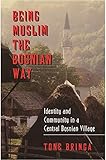Being Muslim the Bosnian Way : Identity and Community in a Central Bosnian Village / Tone Bringa.
Material type: TextSeries: Princeton Studies in Muslim Politics ; 55Publisher: Princeton, NJ : Princeton University Press, [2021]Copyright date: ©1996Description: 1 online resource (312 p.) : 10 halftones, 2 maps, 1 line illustrationContent type:
TextSeries: Princeton Studies in Muslim Politics ; 55Publisher: Princeton, NJ : Princeton University Press, [2021]Copyright date: ©1996Description: 1 online resource (312 p.) : 10 halftones, 2 maps, 1 line illustrationContent type: - 9781400851782
- Ethnicity -- Bosnia and Herzegovina
- Islam -- Bosnia and Herzegovina -- History
- Muslims -- Bosnia and Herzegovina -- Ethnic identity
- Muslims -- Bosnia and Herzegovina
- Nationalism -- Bosnia and Herzegovina
- SOCIAL SCIENCE / Anthropology / General
- Abortion
- Affinal relations
- Alcohol
- Amulets
- Birth control
- Bosnian Serbs
- Bulas
- Burial ceremony
- Catholics
- Communism
- Dervishes
- Divination
- Easter holiday
- Employment
- Evil eye
- Faith healers
- Healing
- Kinship ties
- Labor
- Life-cycle rituals
- Mevluds
- Mixed marriages
- Mosque
- National census
- Ottoman empire
- Patrilocality
- Population statistics
- Ramadan
- Rituals
- Socioeconomic levels
- Sufism
- Tito government
- Urbanization
- Women
- Yugoslavia
- 305.6/971049742 20
- online - DeGruyter
| Item type | Current library | Call number | URL | Status | Notes | Barcode | |
|---|---|---|---|---|---|---|---|
 eBook
eBook
|
Biblioteca "Angelicum" Pont. Univ. S.Tommaso d'Aquino Nuvola online | online - DeGruyter (Browse shelf(Opens below)) | Online access | Not for loan (Accesso limitato) | Accesso per gli utenti autorizzati / Access for authorized users | (dgr)9781400851782 |
Frontmatter -- Contents -- Illustrations -- Foreword -- Preface -- A Note on Language and Pronunciation -- Introduction -- One History, Identity, and the Yugoslav Dream -- Two A Bosnian Village -- Three Men, Women, and the House -- Four Marriage and Marriage Procedures -- Five Caring for the Living and the Souls of the Dead -- Six Debating Islam and Muslim Identity -- Notes -- Glossary of Bosnian Terms -- Bibliography -- Index
restricted access online access with authorization star
http://purl.org/coar/access_right/c_16ec
"I have been able to follow a Bosnian community over a period of six years, during which it has undergone dramatic changes. In the late 1980s people were working hard against economic crisis. In 1990 they were full of optimism for the future. In January 1993 the village was in fear, surrounded by war on all sides. In April 1993 it was attacked by Croat forces. In October 1993 none of the Muslims in the village remained. They had either fled, been placed in detention camps, or been killed."Thus begins Tone Bringa's moving ethnographic account of Bosnian Muslims' lives in a rural village located near Sarajevo. Although they represent a majority of the population in the Republic of Bosnia and Herzegovina, Bosnian Muslims are still members of a minority culture in the region that was once Yugoslavia. The question of ethno- national identity has become paramount in this society, and the author focuses on religion as the defining characteristic of identity. Bringa pays particular attention to the roles that women play in defining Muslim identities, and she examines the importance of the household as a Muslim identity sphere. In so doing, she illuminates larger issues of what constitutes "nationality."This is a gripping and heartfelt account of a community that has been torn apart by ethno-political conflict. It will attract readers of all backgrounds who want to learn more about one of the most intractable wars of the late twentieth century and the people who have been so tragically affected.
Mode of access: Internet via World Wide Web.
In English.
Description based on online resource; title from PDF title page (publisher's Web site, viewed 30. Aug 2021)


